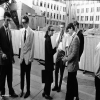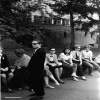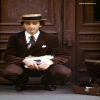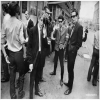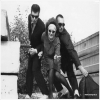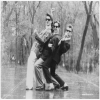

Stylyagas
|
Being actually another revival of the Edwardian style stilyagas of the 80-s had their special features. The preceding generations saw the exterior style in their own way relating it with classic rockabilly (like men of the 60-s) or with jazz hepcats (like men of the 70-s). Yet in the “Olympic” decade, aside from the obvious “new-wave” taint there were some particular displays of “pure style”. So in Leningrad till the mid 80-s there were devotees of the 50-s vintage style who formed the “teddy boys club”, that came off vividly in 1983-84. Later there was a short-term manifestation of the “nostalgists” before the suit fashion has mixed with aesthetics of the “new romantics” or melted in rockabilly culture. The most popular hangout place of this style followers was a café called “The Climate”. In the early 80-s in Moscow besides the senior jazz stilyagas appeared a group of “the wide ones” or as they were also called “utesovtsy” (after Leonid Utesov, the Soviet singer of the 20-s, the trendsetter of wide suits). By the mid 80-s, when Perestroyka gave the classic rock-n-roll the green light, quite young stilyagas started to appear, who were replenishing their street collections from their parents’ wardrobes. These groups featured in Leningrad under the name of “the secretists”, while in Moscow they were called “the bravists” (after bands “Secret” and “Bravo”). “The new stilyagas” later became the main visitors of Moscow consignment shops, cafes “Resonance” and “Konyushnya” (The Stable) and Tishinsky flea-market. In the second half of the 80-s the young growth divided into fans of the Soviet rock-n-roll and proletarian jazz, who existed for a few years in form of a hangout on Arbat street, and fans of classic rockabilly, who formed Elvis Presley fan-club. The last display of the “pure style” at the turn and in the early 90-s was expressed by devotion to the vintage Soviet aesthetics of Tishinsky flea-market and generalized characters of the Soviet “nerds”, “janitresses”, “aristocrats” and “skiers”, that were generated by those who dropped out of all the subculture styles categories and were later labeled as “freaks”.But all this had nothing to do with what was meant by the word “stilyaga” neither in the postwar period nor even in the 80-s.  go back to "Street Styles" go back to "Street Styles" |


